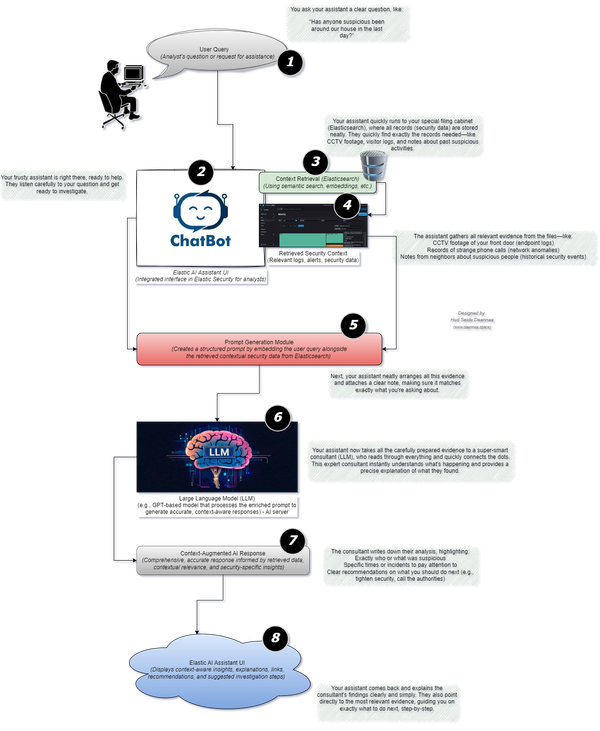The Evolution of Search Engines: From Google to ChatGPT – Navigating the Future of AI and Data Privacy
The rise of AI chatbots like ChatGPT marks a new era in search technology, moving beyond keyword-based results to conversational responses. While revolutionary, this shift raises serious data privacy concerns, particularly for governments and large organizations

In the late 1990s, search engines like Google fundamentally changed how we interact with information, making vast amounts of data instantly accessible. For years, the world of search has evolved, becoming more sophisticated, yet still rooted in a keyword-based system where users input queries and sift through links. However, the arrival of AI-powered chatbots like ChatGPT has revolutionized this model, offering real-time, conversational responses that provide direct answers to user queries. This is a profound leap in the evolution of search technology, but it also introduces significant data privacy concerns—especially for governments and large organizations.
ChatGPT: A Game-Changer in Search
Unlike traditional search engines, ChatGPT processes language in a way that feels more human, conversational, and intuitive. Users no longer need to sort through links to find answers; they can simply ask the AI directly and receive an immediate, comprehensive response. Here’s how ChatGPT is reshaping search:
-
Conversational Ease: ChatGPT responds in a conversational format, making the user experience feel natural and engaging. This is a marked improvement over keyword-driven searches that can feel mechanical and often require follow-up searches.
-
Direct and Detailed Responses: Users get direct answers, often more thorough than what traditional search results can offer. This is particularly helpful in industries like healthcare, education, and customer service, where professionals need accurate, detailed information quickly.
-
Efficiency: ChatGPT provides contextually relevant, on-the-spot responses, streamlining the search process. The ability to understand follow-up questions and maintain a conversational thread greatly reduces the time spent searching.
-
Adaptability and Personalization: ChatGPT can adapt to individual users' needs, providing personalized responses based on prior interactions within a session. This capability enhances learning and productivity, making it an indispensable tool for various industries.
While the benefits of AI-driven search are clear, data privacy risks—particularly regarding how governments and corporations manage and protect sensitive data—must not be ignored .
The Data Privacy Dilemma: Implications for Governments and Organizations
One of the greatest concerns surrounding AI chat systems like ChatGPT is the risk of data collection and retention, especially for governments and large organizations that handle sensitive information. AI models rely on vast amounts of data to improve their accuracy, which means that the data submitted by users can be collected, stored, and used in ways that may not always be transparent .
A notable example is Samsung's incident, where employees unintentionally leaked sensitive company information by submitting it into ChatGPT. This type of inadvertent exposure is just the beginning of a much larger problem: the accumulation of personally identifiable information (PII) and confidential data over time by AI models.
The Danger of Accumulated Data: Predicting Behavior and Creating Pseudo-Models
As more people and organizations interact with platforms like ChatGPT, the data collected—including individual behaviors, preferences, and decision-making patterns—can be used to train increasingly sophisticated models. This presents a new danger:
-
Behavioral Prediction: Data collected from interactions with AI models can accumulate over time, allowing hosts (whether corporations or governments) to develop an understanding of how individuals behave. This data can then be used to predict future actions .
-
Pseudo-Models of Users: As data is collected and refined, it becomes possible to create pseudo-models of individuals or groups based on their interactions with AI platforms. Governments or corporations that control these models could build digital replicas of users that mimic their behaviors .
-
Strategic Intelligence: Countries controlling powerful LLMs (Large Language Models) like ChatGPT stand to gain significant strategic intelligence. With access to global user data, they can build predictive models to gain insights into economic trends and national security threats .
Governments and the Future of AI: Unavoidable Adoption but Necessary Caution
As AI becomes more integrated into our lives, it is clear that AI models like ChatGPT are here to stay. They offer unprecedented benefits in terms of efficiency and accessibility but come with significant risks—especially regarding data security . Governments face a dilemma; they need to leverage AI while being cautious about data collection practices.
Countries controlling AI platforms could build detailed profiles of key government officials or public sentiment over time. This would allow them to predict decisions and influence policies .
The Data Dilemma: The Price of AI’s Convenience
As much as we might want to resist using AI platforms due to these concerns, opting out is not a viable option. The benefits—from enhanced communication to efficient decision-making—are too significant to ignore . However, caution is essential; stakeholders must take proactive steps to secure their data when interacting with AI models.
In conclusion, while ChatGPT offers game-changing capabilities in accessing information, it introduces serious risks—particularly regarding data privacy and geopolitical intelligence. Governments must tread carefully while adopting AI systems.
References
- Metz, R. (2023). Don't tell anything to a chatbot you want to keep private. CNN. https://edition.cnn.com/2023/04/06/tech/chatgpt-ai-privacy-concerns/index.html
- Dialzara. (n.d.). AI Chatbot Privacy: Data Security Best Practices. https://dialzara.com/blog/ai-chatbot-privacy-data-security-best-practices/
- IAPP. (n.d.). Chatbots, AI and the future of privacy. https://iapp.org/news/a/chatbots-ai-and-the-future-of-privacy
- Csernatoni, R. (2023). The EU AI Act and Chatbots: Implications and Challenges. Carnegie Europe. https://carnegieeurope.eu/2023/06/22/eu-ai-act-and-chatbots-implications-and-challenges-pub-89820





